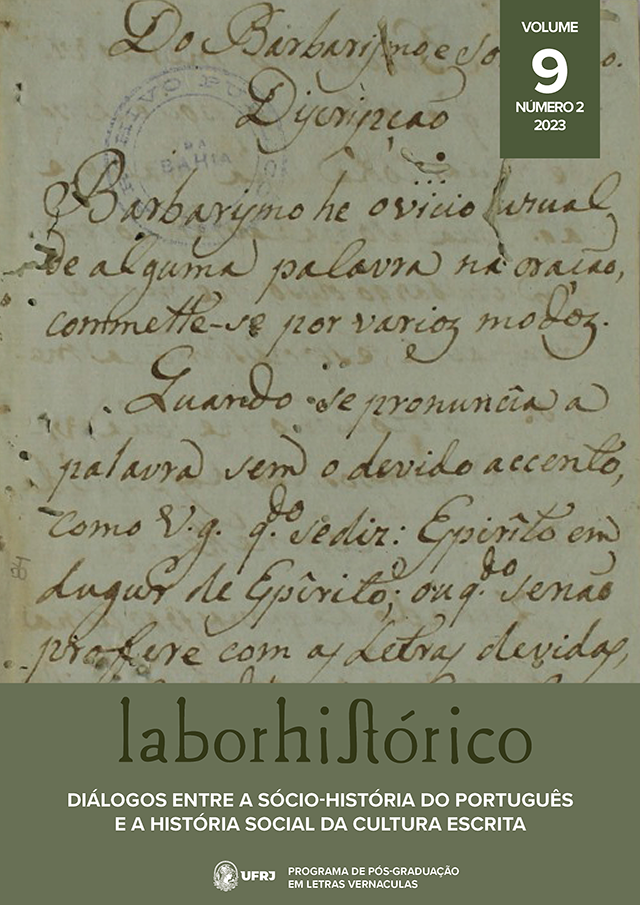Linguistic variation in sixteenth-century portuguese: contraction between com and o(s) in Peregrinação
DOI:
https://doi.org/10.24206/lh.v9i2.59885Keywords:
Variação Linguística, Língua Portuguesa, Fonética Sintática, Português ClássicoAbstract
The present study focuses on the linguistic behavior of the sequence com + o(s) in sixteenth-century Portuguese in the work Peregrinação, by Fernão Mendes Pinto. The use of the masculine variants not contracted – com o(s) – and contracted – co(s) was analyzed. From a theoretical point of view, the study was based on the Labovian theory of variation, and, from a methodological point of view, it analyzed six independent variables (number of the second element, word class of the second element, syntactic function of the prepositional phrase, structure of the noun phrase internal to the prepositional phrase, first phoneme after the second element and location in the work). Only three of these variables were selected as statistically significant in conditioning the variation between not contracted and contracted forms: the second, the third and the fourth. Therefore, the importance of morphosyntactic factors in conditioning this case of linguistic variation was verified.
Downloads
References
BISOL, L. O sândi e a ressilabação. Letras de Hoje, Porto Alegre, v. 31, n. 2, p. 159-168, 1996. Disponível em: https://revistaseletronicas.pucrs.br/ojs/index.php/fale/article/view/15601. Acesso em: 26 jul. 2023.
CÂMARA JR., J. M. Dicionário de linguística e gramática: referente à língua portuguesa. 15. ed. Petrópolis: Vozes, 1985.
CAMBRAIA, C. N. Contributo para uma gramática do português clássico: a linguagem da Peregrinação de Fernão Mendes Pinto. In: CONGRESSO NACIONAL DA ABRALIN, II, Florianópolis, 25 a 27 de fevereiro, 1999. Anais... Florianópolis: Abralin, 2000. p. 1355-1362. Cd-rom.
CAMBRAIA, C. N. Mudança interrompida na história do português: nós outros e vós outros. In: CONGRESSO INTERNACIONAL DA ABRALIN, II, Fortaleza, 13 a 16 de março, 2001. Anais... Fortaleza: UFC, 2003. v. 1, p. 112–114. Disponível em: https://www.abralin.org/site/wp-content/uploads/2020/03/ABRALIN_26.pdf. Acesso em: 26 jul. 2023.
CAMBRAIA, C. N.; CUNHA, E. L. T. P. Atribuição de autoria em discussão: o caso dos títulos dos capítulos da Peregrinação. Confluência, Rio de Janeiro, v. 63, 2022.
CAMBRAIA, C. N.; LEITE, R. C. S. Aplicação estendida de analisador computacional na extração de sintagmas nominais em textos antigos: um estudo de caso. Texto Livre: Linguagem e Tecnologia, Belo Horizonte, v. 15, p. e37557-e37557, 2022. Disponível em: https://periodicos.ufmg.br/index.php/textolivre/article/view/37557. Acesso em: 26 jul. 2023.
CAMBRAIA, C. N.; RAMALHO, V. H. B.; STRADIOTO, S. A. Gramaticalização e lexicalização no limite: demonstrativos românicos. Caligrama: Revista de Estudos Românicos, Belo Horizonte, v. 16, p. 33-67, 2011. DOI: http://dx.doi.org/10.17851/2238-3824.16.2.33-67. Acesso em: 26 jul. 2023.
CUNHA, C. Estudos de poética trovadoresca: versificação e ecdótica. Rio de Janeiro: Instituto Nacional do Livro, 1961.
CUNHA, C.; CINTRA, L. F. L. Nova gramática do português contemporâneo. 2. ed. 5. reimpr. Rio de Janeiro: Nova Fronteira, 1985.
KIPARSKY, P. Paradigm effects and opacity. Stanford, CA: Stanford University, 1998.
KIPARSKY, P. Opacity and ciclicity. The Linguistic Review, Dordrecht, n.17, p.351-65, 2000.
LABOV, W. Sociolinguistics patterns. Philadelphia: University of Pennsylvania, 1972.
LABOV, W. Where does the linguistic variable stop? A response to Beatriz Lavandera. Working Papers in Sociolinguistics, Austin, n. 44, p. 1-17, 1978. Disponível em: https://eric.ed.gov/?id=ED157378. Acesso em: 26 jul. 2023.
LABOV, W. Building on empirical foundations. In: LEHMANN, W. P.; MALKIEL, Y. (Eds.) Perspectives on historical linguistics. Amsterdam/Philadelphia: John Benjamins, 1982. p. 17-92.
LABOV, W. Principles of linguistic change: internal factors. Oxford/Cambridge: Blackwell, 1994.
LABOV, W. Principles of linguistic change: social factors. Oxford/Cambridge: Blackwell, 2001.
LABOV, W. Principles of linguistic change: cognitive and cultural factors. Oxford/Cambridge: Blackwell, 2005.
MASSINI-CAGLIARI, G. A música da fala dos trovadores: desvendando a prosódia medieval. São Paulo: Editora UNESP, 2015. Disponível em: http://editoraunesp.com.br/catalogo/9788568334584,a-musica-da-fala-dos-trovadores/downloadpdf. Acesso em: 26 jul. 2023.
MOLLICA, M. C. Fundamentação teórica: conceituação e delimitação. In: ____. Introdução à sociolinguística: o tratamento da variação. São Paulo: Contexto, 2003. p. 9-14.
MONTEIRO, A. C. Prefácio. In: PINTO, F. M. Peregrinaçam = Peregrinação. Versão integral em português moderno por Adolfo Casais Monteiro. Lisboa; Rio de Janeiro: Sociedade de Intercâmbio Cultural Luso-Brasileiro; Casa do Estudante do Brasil, 1952-1953. 2 v. Disponível em: http://purl.pt/26736. Acesso em: 26 jul. 2023.
NOGUEIRA, J. Dicionário e gramática de "Os Lusíadas". Lisboa: Livraria Freitas Bastos, 1960.
OLIVEIRA, F. Grammatica da lingoagem portuguesa. Lisboa: Germão Galharde, 1536. Disponível em: https://purl.pt/120. Acesso em: 26 jul. 2023.
PINTO, F. M. Peregrinaçam de Fernam Mendez Pinto [...]. Lisboa: Pedro Crasbeeck, 1614. Disponível em: https://purl.pt/82. Acesso em: 26 jul. 2023.
PINTO, F. M. Peregrinação. In: BIBLIOTECA Virtual dos Autores Portugueses. Coordenação científica de Ivo Castro, Teresa Amado, Cristina Almeida Ribeiro e Paula Mourão. Lisboa: Biblioteca Nacional, 1998. CD-ROM, d. 2.
PRINCE, A. S.; SMOLENSKY, P. Optimality theory: Constraint Interaction in Generative Grammar. Newark, NJ: Rutgers University, 1993.
SILVA NETO, S. da. Manual de filologia portuguesa. 2. ed. Rio de Janeiro: Acadêmica, 1957.
TARALLO, F. A pesquisa sócio-linguística. 2. ed. São Paulo: Ática, 1986.
TEYSSIER, P. História da língua portuguesa. Trad. de Celso Cunha. 5. ed. Lisboa: Sá da Costa, 1993.
VASCONCELLOS, C. M. de. Poesias de Francisco de Sá de Miranda. Halle: Max Niemeyer, 1885. Disponível em: https://purl.pt/23578. Acesso em: 26 jul. 2023.
WEINREICH, U.; LABOV, W.; HERZOG, M. Empirical foundations for theory of language change. In: LEHMANN, W. P.; MALKIEL, Y. (Eds.) Directions for historical linguistics. Austin: University of Texas Press, 1968. p. 95-195.
Downloads
Published
Issue
Section
License
Authors who publish with this journal agree to the following:
a. The authors hold copyright of the published papers; authors are the sole responsible party for published papers content; the published paper is licensed under a Creative Commons Attribution-NonCommercial 4.0 International License which allows the sharing of the publication as long as there is acknowledgement of authorship and publishing by Revista LaborHistórico.
b. Authors should seek previous permission from the journal in order to publish their articles as book chapters. Such publications should acknowledge first publishing by LaborHistórico.
c. Authors may publish and distribute their papers (for example, at institutional repositories, author's sites) at any time during or after the editorial process by Revista LaborHistórico.


